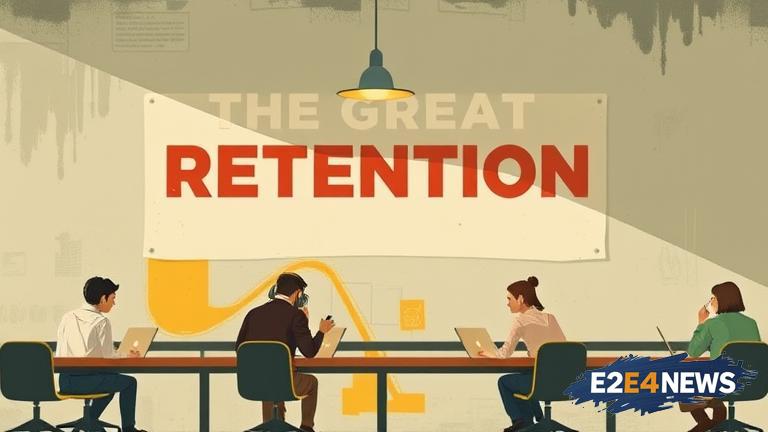The modern workforce is undergoing a significant shift, with many employees opting to stay in their current jobs rather than seeking new opportunities. This trend, known as the ‘Great Retention,’ is being driven by a combination of factors, including job security, work-life balance, and a sense of purpose. According to recent studies, workers are prioritizing stability and predictability in their careers, and are willing to forgo higher salaries and more prestigious job titles in order to achieve it. One of the primary reasons for this shift is the changing nature of work itself, with many jobs becoming more automated and less secure. As a result, workers are placing a greater emphasis on finding employment that offers a sense of stability and continuity. Another factor contributing to the Great Retention is the growing awareness of the importance of work-life balance. With the rise of remote work and flexible scheduling, employees are able to prioritize their personal lives and well-being, and are less likely to sacrifice their health and happiness for the sake of their job. Additionally, workers are seeking out employment that aligns with their values and provides a sense of purpose, leading to increased job satisfaction and reduced turnover rates. The Great Retention also has significant implications for businesses and organizations, which must adapt to the changing needs and expectations of their employees. By offering competitive salaries, comprehensive benefits, and opportunities for growth and development, companies can attract and retain top talent, and stay ahead of the competition. Furthermore, the Great Retention highlights the need for employers to prioritize employee well-being and job satisfaction, and to create a positive and supportive work environment. This can involve implementing policies and programs that promote work-life balance, such as flexible scheduling and telecommuting options, as well as providing opportunities for professional development and advancement. The Great Retention is a global phenomenon, with workers in countries around the world prioritizing job security and stability. In the United States, for example, workers are seeking out employment that offers a sense of purpose and fulfillment, and are willing to make sacrifices in order to achieve it. Similarly, in Europe, workers are prioritizing work-life balance and job security, and are seeking out employment that aligns with their values and provides a sense of stability. The Great Retention also has significant implications for the future of work, with many experts predicting that it will lead to a more stable and secure workforce. As workers prioritize job security and stability, they are less likely to switch jobs frequently, leading to reduced turnover rates and increased productivity. Additionally, the Great Retention highlights the need for businesses and organizations to prioritize employee well-being and job satisfaction, and to create a positive and supportive work environment. By doing so, companies can attract and retain top talent, and stay ahead of the competition. In conclusion, the Great Retention is a significant trend that is shaping the modern workforce. By prioritizing job security, work-life balance, and a sense of purpose, workers are creating a more stable and secure workforce, and are driving businesses and organizations to adapt to their changing needs and expectations. As the workforce continues to evolve, it is likely that the Great Retention will have a lasting impact on the future of work.
